‘I won’t ever regret stopping now, that’s for sure’ – Mark Cavendish’s last Tour de France wasn’t really about the record
Manxman on why he kept on going and why he won’t be back in 2025
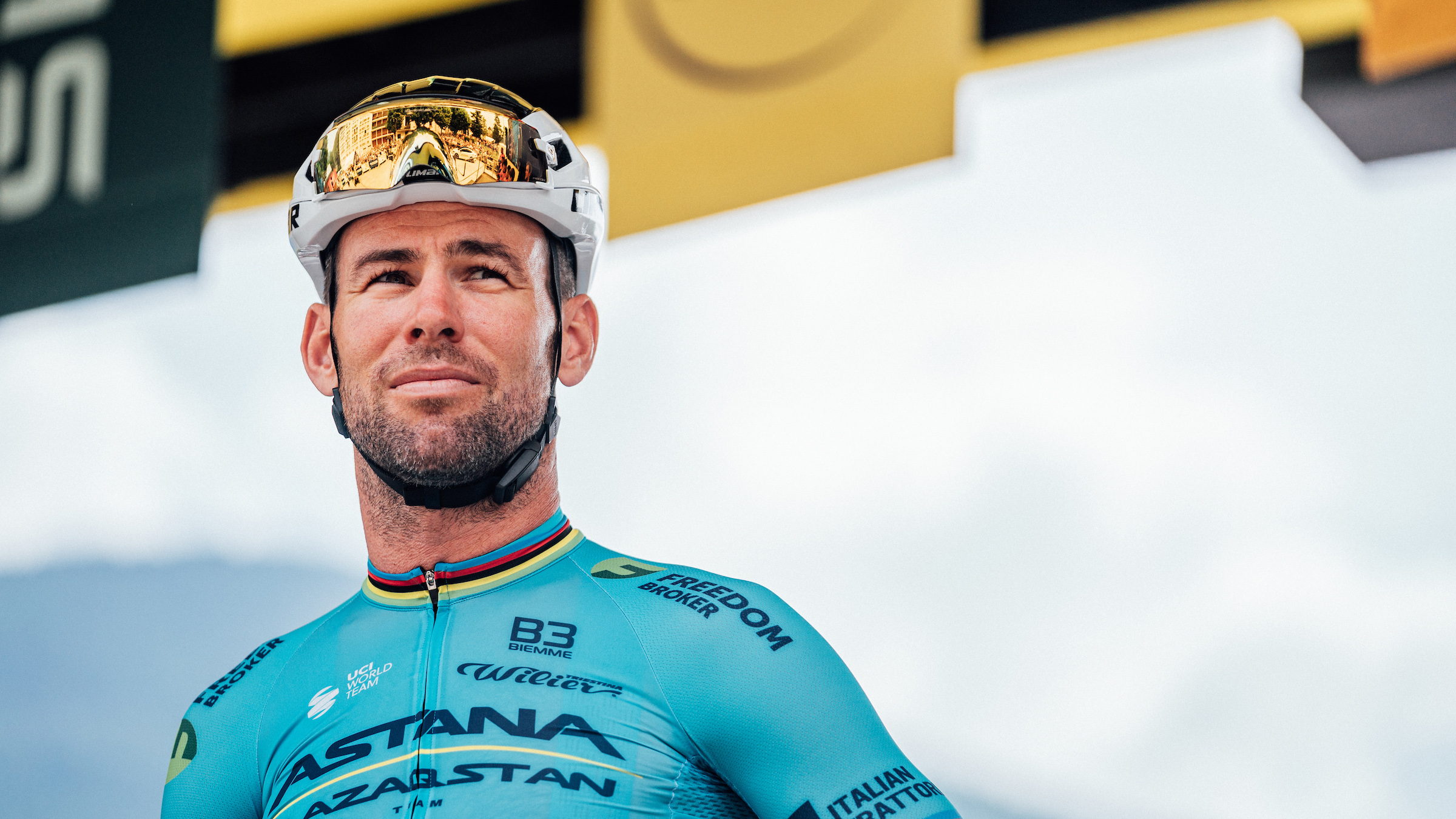
The towns changed but the feeling never really did. From Châteauroux to Carcassonne, Mark Cavendish would scarcely have descended from the podium before his thoughts were already slowly turning from that day’s bouquets to the next day’s pressures. For sixteen years, a Tour de France stage win was eaten bread soon forgotten. There was rarely any time to savour the taste.
The build-up to the most recent stage win had been interminable, from late in the 2021 Tour to the opening week of this year’s race. In between, Cavendish left one team and his career survived the collapse of another. He missed selection for one Tour then crashed out of the next. He announced his retirement last year only to walk it back for one last go on the carousel.
Cavendish’s victory in Saint-Vulbas last week gave him an outright hold on the record for Tour stage wins he had shared with Eddy Merckx. For three years, the number ‘35’ had been attached to him as a burden whether he cared to carry it or not. Now, by surpassing Merckx, one television reporter joked, Cavendish had ‘completed’ cycling. This victory must surely have hit differently to all the others. The itch must finally have been scratched.
Well, yes and no. It’s the afternoon of the first rest day of the Tour, and Cavendish is sitting outside the Novotel in Orléans, where his family have visited him for lunch. He has achieved what he set out to do at this race, but there is still distance left to run until Nice. The Tour is too relentless to allow a man to rest on his laurels. While he’s still here, he reckons he might as well keep trying to win. For a sprinter, the appetite is never entirely sated.
“Whether you like it or not, it is back to work the day after. That’s fundamentally it,” Cavendish tells Cyclingnews. “Ok, if you win on the Champs-Elysees, it’s a bit different, but when you’re still going out to do your job… You can be happy, there is less pressure obviously for the rest of the stages, but there’s still the pressure of riding and trying to be successful afterwards. After the Tour, yeah, I’ll have a long time to celebrate…”
Although the pursuit of the record has come to define the last three years of Cavendish’s career in the popular imagination, his lead-out man Michael Mørkøv had a more nuanced view of the whole thing in Colombia at the start of this season. The record, Mørkøv smiled, was simply an excuse to keep going. It wasn’t quite raging against the dying of the light, but if Cavendish was still aboard a bike approaching his 40th birthday, it had less to do chasing a statistic than with keeping hold of a feeling.
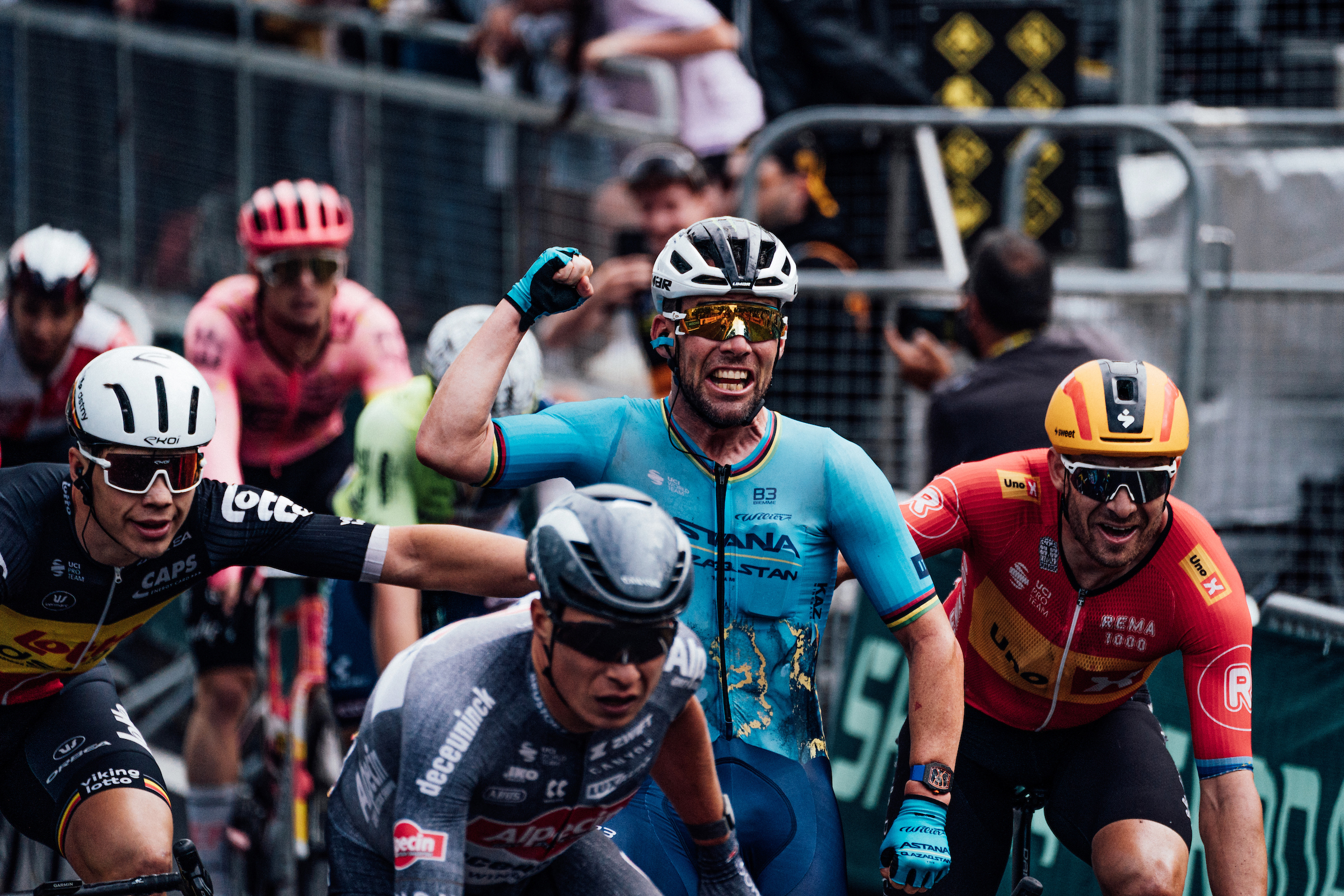
“I think you’re right. It’s just that you need a goal,” Cavendish says. “I was ready to stop last year. But I’m more ready this year, you know? A goal gives you the drive to go and put 100% into it. And that’s what winning another stage here was – that was the goal. I mean, it could have been anything. But, well, it was never going to be anything else, was it? So that was the goal, that’s what gave me to drive to get up every day to push myself to the limit. And I’m happy I did it.”
Sign up to the Musette - our subscriber-only newsletter
It raises an obvious question, of course. If pursuing the record was a pretext to keep the flame alive, who is to say that Cavendish will be happy to extinguish it at the end of this season? On some damp, drizzly November day, will a part of Cavendish’s soul not start to yearn all over again for the big stage in July? Might he be tempted to rethink his retirement again and just keep on going?
“No…” he says quietly. “And that’s why I’ve put every single last drop into it. I’ve got no regrets. The thing my wife Peta said to me through all the problems I’ve ever had, through every time I’ve thought I can’t do it or I don’t want to do it… She’s always said you can’t look back in ten years and have a regret that you didn’t carry on or you didn’t try, you know? That was what she always said to me. And when I stop now, there’s nothing… I won’t ever regret stopping now, that’s for sure.”
A false start on a career ending
Cavendish’s relationship with the Tour could have ended very differently, of course. Although he confirms that he would not have retired in 2021 even if he had claimed his 35th stage win on the Champs-Élysées, there was a moment when it looked like the decision had been taken out of his hands.
In 2018, Cavendish was enduring a second season ravaged by the lingering effects of Epstein-Barr and he arrived at the Tour a shadow of the man who had claimed handfuls of wins on the race during his imperial phase. That year, racing with Dimension Data, he made little impression in the sprints, and he might have guessed what was coming once the race hit the mountains on stage 11 to La Rosière.
A short stage made for a tight time cut, and the task was complicated still further by Team Sky’s fierce tempo at the front. Cavendish was distanced early, and he rode the final climb alone, already certain that he was doomed to finish outside a time limit set at little more than half an hour behind the stage winner, his old friend Geraint Thomas.
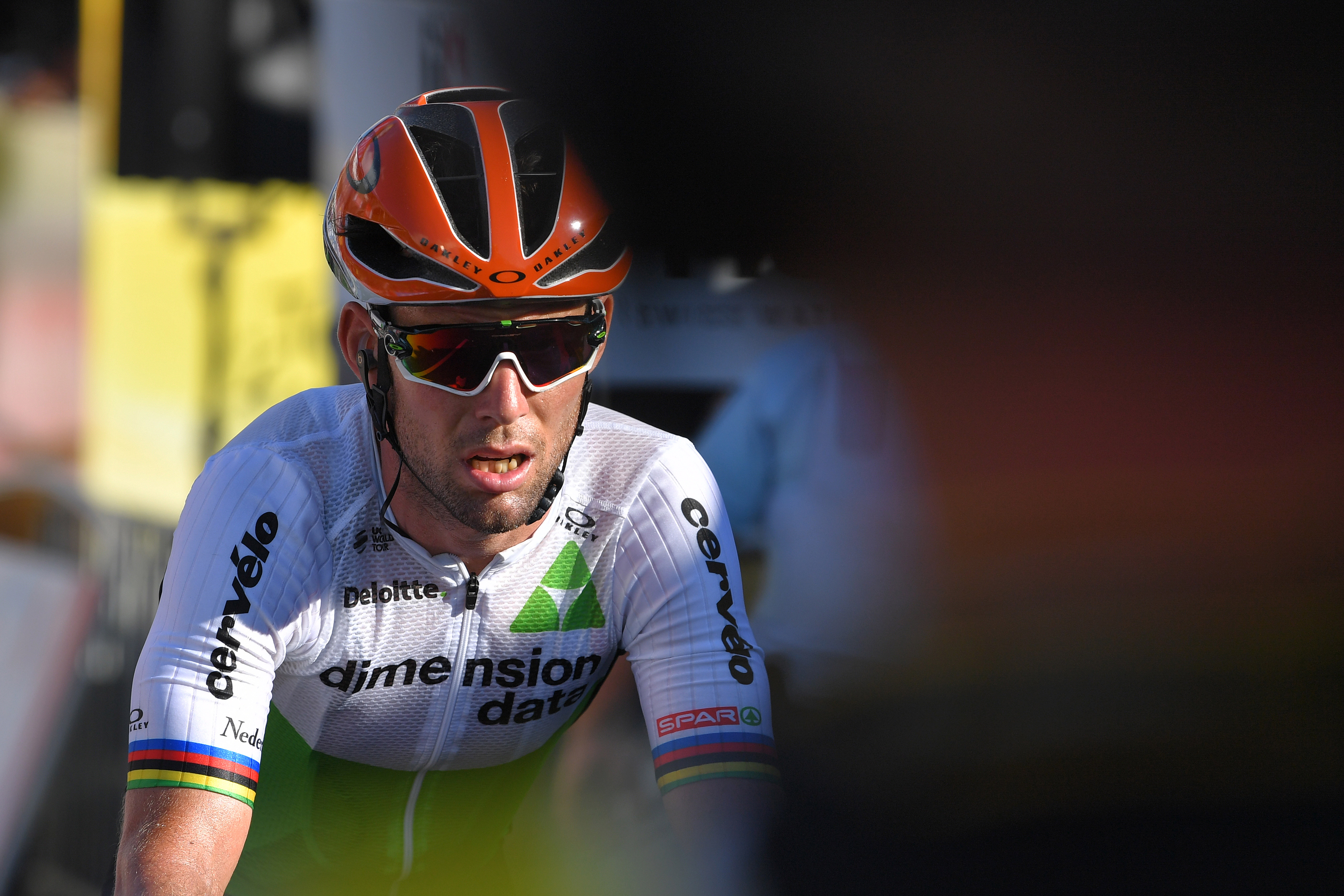
More than an hour would pass before Cavendish laboured into view on the finishing straight. During his final ascent, the race speaker provided updates on his lonely plight on the mountainside, and a crowd lingered at the finish line. The vigil kept by people like his old coach Rod Ellingworth and his old British teammate David Millar felt something like cycling’s version of the dimming of the lights on Broadway.
Most present assumed it was Cavendish’s final act at the Tour, and his decision to press on rather than climb off looked like a way of saying goodbye. In many ways, it was a most appropriate kind of farewell. If the stage wins had brought Cavendish glory, then his labours here brought him honour. At a remove of six years, however, he insists he wasn’t thinking of the end at La Rosière, but of a promise he had silently made in the beginning.
“I climbed off on my first ever Tour de France and I vowed never to do that again,” he says. “Ok, there’ve been Tours I haven’t been able to finish, but I vowed never to do it again. I respect the race too much, I respect everything that goes into it. You finish… How can I tell my kids to finish what they’ve started if I don’t lead by example?”
Fighting against the time limit
Earlier this year, Cavendish again found himself outside the time limit, when he was stricken by illness at Tirreno-Adriatico and forced to rewrite his Spring schedule on the hoof. While doubt may never have entered his camp, he was keenly aware that it was circulating freely outside the tent. Sprinters don’t tend to win races at the age of 39. Some wondered if this was going to be un Tour de trop. Plenty more would think it when he struggled with heatstroke on stage 1 here.
Cavendish complains about it now, but it’s hard to shake off the sense that a part of him tacitly welcomed those doubts. For a moment, the man who had won as many Tour stages as Merckx was once again the kid whose power output had failed to impress the gurus at British Cycling. He is hardly the first sportsperson to thrive on responding to slights, real or imagined.
“Somebody said it was a humiliation, actually,” Cavendish says of his travails at Tirreno. “In 2010, I only won two races before the Tour de France, and then I won five stages. But it’s human nature to forget quick, I guess. That’s how it is.
“I think everyone’s entitled to their opinion, and that’s what’s beautiful about sport and art. But when it’s presented as fact or even as spite… I think some of your colleagues in the media got a bit spiteful. And there’s no need for that, really. Like, I don’t know why you’d wish that bad on somebody else.
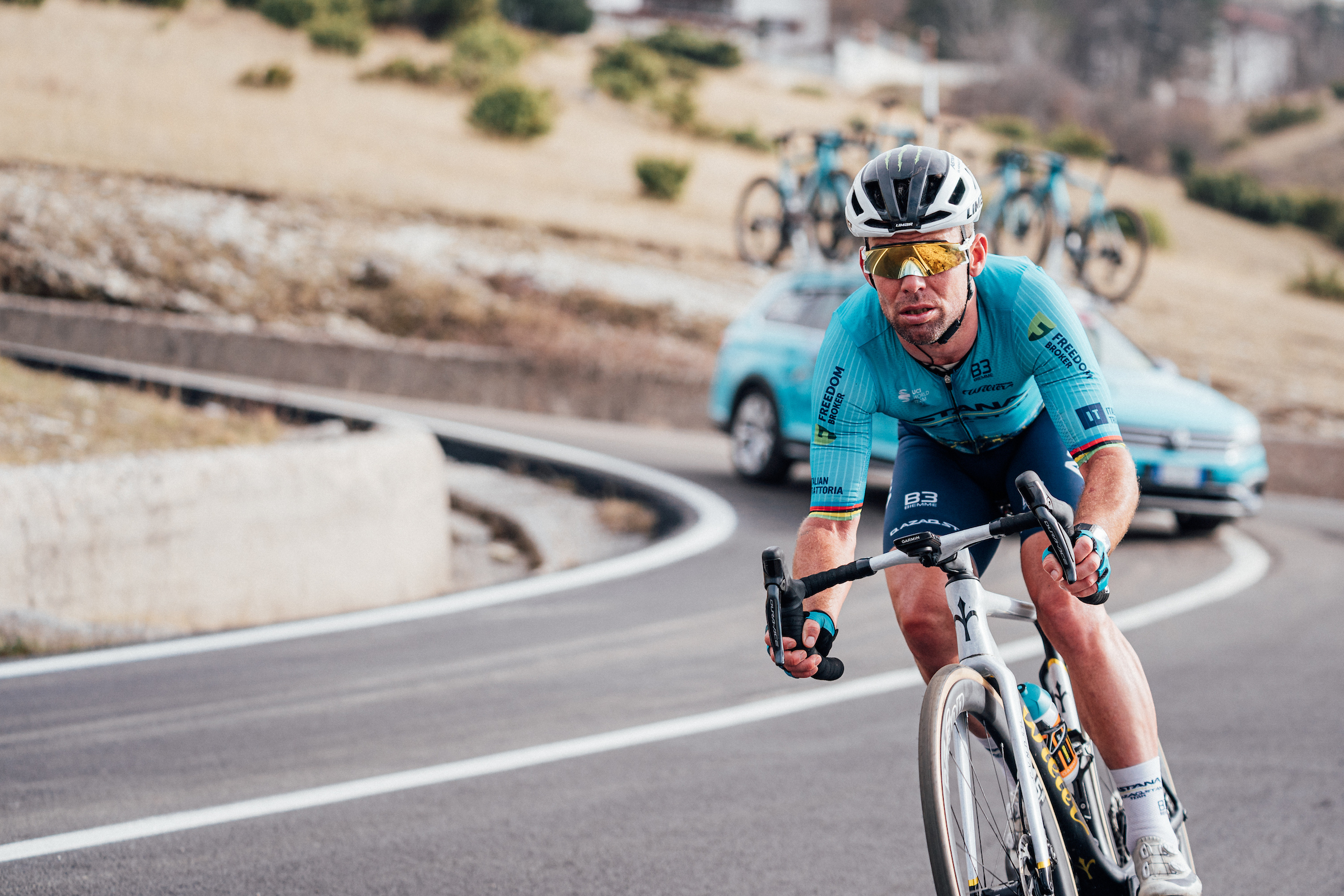
“There was a time in my life when I felt like that, when I was happy in somebody else’s misfortune, say. But it’s probably the ugliest emotion I’d ever felt in my life, and I was in a terrible mindset to be feeling that.”
While Cavendish may never have doubted his ability to be competitive at the Tour, one wonders if he ever questioned the decision to postpone his retirement. His 2024 schedule has featured precious little time at home. His year began with long training camps in Spain and Colombia, while the final build-up to the Tour saw him flit between races and training stints in coach Vasilis Anastopoulos’ native Greece. Life on the road inevitably weighs more heavily on a man on the cusp of middle age with five children at home.
“There’s times when you make sacrifices and when you suffer, and there’s obviously times that are difficult,” Cavendish says. “But I know how lucky I am to have my family, and how my wife deals with things, like a machine, is phenomenal.”
Back in 2016, on the morning after his silver medal at the World Championships, Cavendish sat in the lobby of a Doha hotel and spoke of having already achieved more or less everything he could in cycling. “I can see the end. I don’t know when that is, but I can see the end now," he said at the time. It was impossible to imagine then that he would spend eight more seasons in the peloton, but here he is, at 39, the second oldest Tour stage winner in history.
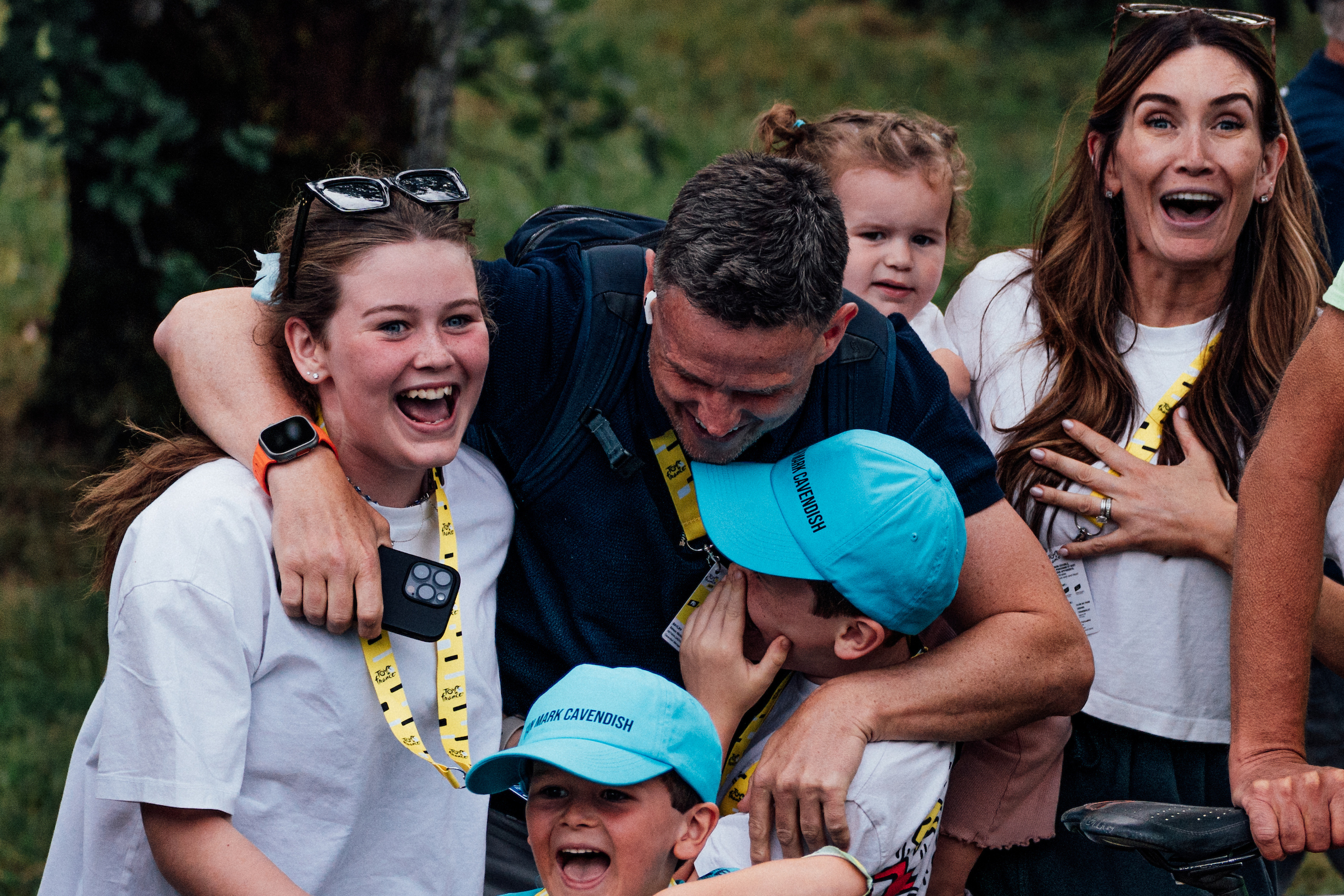
In between, Cavendish endured fallow seasons between 2017 to 2020, blighted by illness and depression. Perhaps those lost years contributed to his subsequent longevity, but for Cavendish, the very notion is moot.
“I don’t know, no idea. And I don’t like to dwell on those years enough to think about whether it would have changed anything. It is what it is, you can’t change what’s happened. You’ve just got to live for the now and the future. You can appreciate your past, but I don’t know…” he says, and then smiles. “And honestly, I kept having kids, didn’t I? I said I can’t retire if they haven’t seen me win. Shit like that gives you a little extra motivation.”
Start to finish
The world was a different place when Cavendish lined up in London for his Tour debut in 2007. At the time, his backstory, including his time as a bank clerk, was so obscure that a misprint for the ages in the Guardian saw this new young Manx sprinter quoted as saying that Ellingworth had turned him “from a fat wanker to a world champion in 15 months.”
When riders of Cavendish’s generation were navigating the juvenile and amateur ranks in the late 1990s and early 2000s, professional cycling was stumbling from one doping scandal to the next, from Festina to Lance Armstrong to Operación Puerto. His debut Tour was completely overshadowed as a sporting contest by Michael Rasmussen’s whereabouts case and by his future manager Alexandre Vinokourov’s positive test for blood doping. He abandoned the race, winless, after a week.
Cavendish’s professional career started at Telekom, just as the team was transitioning from the fall-out of Operación Puerto to its new guise as Highroad. Rolf Aldag, now of Red Bull-Bora-Hansgrohe, had confessed to doping as a rider and he played a key role in the team’s rebranding and renaissance under Bob Stapleton.
“Rolf Aldag said to us, ‘I’m a rider who has ridden doped and who has ridden not doped, and I’m telling you it’s possible to do it without doping,’” Cavendish says. “You can say what you want, like ‘how can someone who has doped say those words?’ But it had a profound effect on us, just how honest and straight he was. That gives you a good foundation and you carry on like that.”
The subsequent implementation of the biological passport offered a shred of cautious optimism for young professionals, but what did Cavendish really believe was possible for him to achieve on entering the sport at that moment, when doping had been so rife for so long?
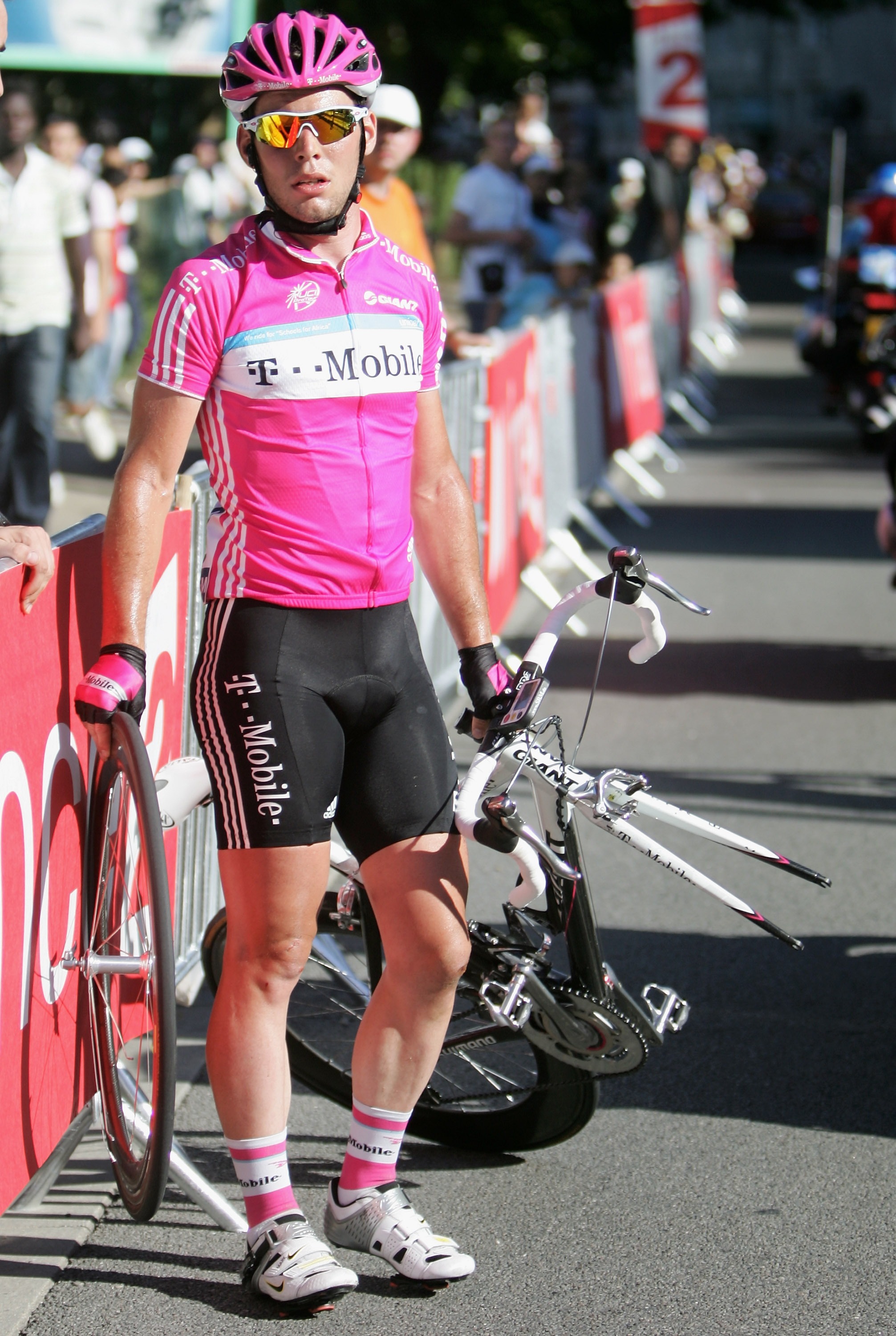
“When I talk to the lads now, I say that I was in a very fortunate position that I felt how fast cycling was and then all of a sudden it slowed down,” Cavendish says. “That helped me… Since then, it’s got faster and faster and faster. Perhaps if I’d started in a different place when it was still warp speed – or now, when it’s again warp speed – I’d never have been able to get going on the treadmill. So I know I’m very fortunate.”
The treadmill kept on rolling and Cavendish always managed to stay on it. He risked falling off on occasion over the years, most recently in late 2022, when his proposed move from QuickStep to B&B Hotels fell through amid the French team’s collapse, but he would find a home in an unlikely place. Vinokourov, the villain of his debut Tour, was now the saviour when Astana-Qazaqstan stepped forward with a contract offer. When Cavendish won in Saint-Vulbas last week, a smiling Vinokourov interrupted his flash interview to wrap him in a hug.
“I didn’t know him too well before, really, but he was always good in the peloton when he was riding,” Cavendish says of his relationship with Vinokourov before joining Astana. “He was the silent assassin, you know. He never had a problem with anyone, and nobody ever had a problem with him, but when he decided that he was going to race, you couldn’t stop it.”
In May, Vinokourov indicated that there would still be a role for Cavendish at Astana after he hangs up his wheels at the end of the season. Cavendish, however, is reluctant to divulge his plans for 2025 just yet or, indeed, his schedule for the remainder of his final season. “For now, I’m just concentrating on the Tour,” he says carefully.
There are still miles to ride between here and the finish in Nice, there are still chances to play the reel back one more time. In Villeneuve-sur-Lot on Thursday, Cavendish was relegated from fifth place after the commissaires adjudged him to have deviated from his line in the sprint. After the stage, Cavendish’s old lead-out man Mark Renshaw, now his directeur sportif at Astana, spoke to reporters on his behalf. “Mark’s really upset and angry about the decision because he believes it was unfair,” Renshaw said.
Proof, as if it were needed, that Mørkøv was right. The record was only ever a part of the story.
Thank you for your Cyclingnews subscription. We use our subscription fees to be able to keep producing all our usual great content as well as more premium pieces like this one. Find out more here.

Barry Ryan was Head of Features at Cyclingnews. He has covered professional cycling since 2010, reporting from the Tour de France, Giro d’Italia and events from Argentina to Japan. His writing has appeared in The Independent, Procycling and Cycling Plus. He is the author of The Ascent: Sean Kelly, Stephen Roche and the Rise of Irish Cycling’s Golden Generation, published by Gill Books.